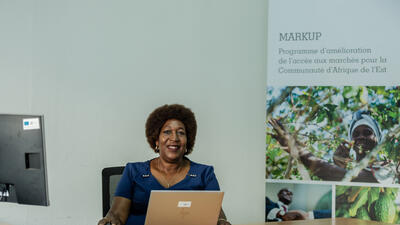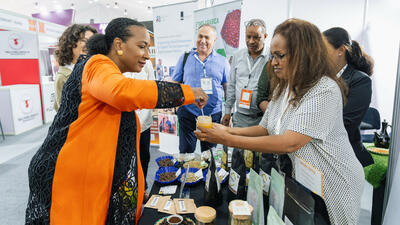

Building cooperatives in Africa for resilience and sustainability
ITC and the International Cooperative Alliance offer holistic support to cooperatives in Africa, so they can engage in more effective, profitable, and sustainable trade.
The International Trade Centre (ITC) recognizes that ‘Partnerships4Purpose’ can contribute to impactful projects and sustainable outcomes. To celebrate the teamwork behind these efforts, ITC is proud to highlight game-changing initiatives that are made possible through strong and meaningful collaboration.
Cooperatives (acting as a hybrid between businesses and institutions) provide the foundational framework that establish reliable governance, accountable leadership, effective management, and scale to improve the competitiveness of their commercial operations.
While cooperatives can play an instrumental role in promoting international trade, there is a need to further improve their performance, provide information and create market linkages to enable their active participation in global value chains.
In particular, partnerships between buyer/retail cooperatives and agricultural/supplier cooperatives can create even more resilient coops, sustainable global value chains and stand for a fairer distribution of power and risk among all value chain actors.
This is how ITC and the International Cooperative Alliance developed a seven-month long pilot project in 2021 to enhance the managerial and operational capacity of supplier cooperatives as well as build business relationships between supplier and buyer cooperatives.
The unique approach: Peer-to-peer knowledge exchange for trade opportunities
Through this new coop-to-coop trade project, the partnership was able to build the capacity of supplier cooperatives and facilitate trade, investment, and knowledge transfer between buyer cooperatives in Argentina, Finland, the Republic of Korea and the United States, and supplier coops in Kenya, Rwanda, Ghana (and later Ethiopia) in the cocoa and coffee sectors.
The organizations organized regular sessions to exchange knowledge between buyer and supplier cooperatives, in which supplier cooperatives learned about the changes they needed to make to their existing processes to better supply to buyer cooperatives.
The World Cooperative Congress in Seoul enabled the participation of selected supplier cooperatives at which they could discuss concrete business opportunities with buyer coops.
The impact: Fostering new business relationships among cooperatives
Despite its short duration, the collaboration between ITC and the International Cooperative Alliance identified suitable cooperatives, brought buy-in from appropriate stakeholders and achieved meaningful results, including:
- Six large buyer cooperatives with combined revenues of over $20 billion confirmed their interest to collaborate.
- Eighteen supplier cooperatives submitted expressions of interest, of which 10 were selected (representing over 200,000 farmers).
- Three supplier coops are discussing concrete transactions with two buyer coops in Finland and the Republic of Korea.
- Six supplier cooperatives are making concrete changes to their business operations after the knowledge exchange sessions with buyer coops.
The pilot showed that cooperatives would prefer to do business with other cooperatives if price and quality were competitive. Peer-to-peer learning is the perfect entry point to build trust between retail and supplier coops. Further, it is not just buyer and supplier coops but a range of cooperatives in services, banking, insurance and other related sectors who could contribute to facilitating coop-to-coop trade.
The partnership between ITC and the International Cooperative Alliance was critical to testing this approach and achieving the results.
Moving forward: Leveraging the momentum
Top cooperative-owned retail chains have put their confidence in ITC to develop the coop-to-coop approach further.
ITC and the International Cooperative Alliance are currently planning the next phase of the pilot project, leveraging the momentum from 2021.
The interventions will expand to include new sectors and types of cooperatives. It will widen the scope of interventions, bring buy-in from a wider number of stakeholders, refine its methodology, and convert business relationships among cooperatives into concrete trade and investment deals.
Interested to collaborate? Let us know!
Please contact Saskia Marx at marx [at] intracen.org (marx[at]intracen[dot]org)















